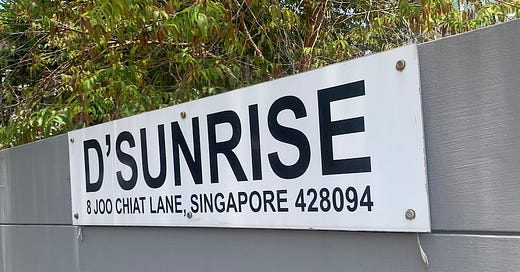I should probably try to avoid speaking Singlish. Hearing British expats finish their sentences with ‘lah’ is like hearing British politicians talking to teenagers, nart mean bruv. Besides, the correct usage of lah, leh and lor has recondite rules that are best left to locals.
Certain parts of Singlish seem more acceptable, however. Basic substitutions such as can instead of yes and is it? instead of really? are normal daily vocabulary for kids and politicians alike. Other favourites include tapao instead of takeaway and merlion instead of vomit. They often come up together.

Singlish dictionaries are usually sold as novelty items, but they are a set text for any aspirational ang moh1. Words such as atas and aiyah are handy substitutions for posh and gosh. Kaypoh means nosy and kiasu means fear of missing out.
But often, Singlish ain’t what you say but the way that you say it. In my office, surrounded by native Singlish speakers, I find myself saying things like you wait first instead of would you mind just waiting over here for a moment - and nobody takes offence, or at least doesn’t show it. Last week I used the sentence cannot because also don’t have instead of that’s not going to work because I haven’t got one either and everybody nodded in understanding, or possibly in mortification.
Yet some Singlish remains a mystery. The arcane usage of ‘one’ has inspired entire academic papers2. It acts as a sort of substitute for pronouns, leading to arse-backwards sentence construction such as this aunty very kaypoh, always asking about people’s love life one, instead of this woman is very nosy, she is always asking about people’s love lives.
Another inexplicable feature is the usage of d’ as a prefix. There are condos dotted around Singapore called D’Sunrise, D’Oasia and even D’Dalvey. One chain of local cafés has the slogan is Enjoy d’Life, which a Singaporean friend suggested is an attempt to sound sophisticated in a European sort of way. D’bonkers.
Other curiosities are pleasingly archaic, such as saying by right to explain that something ought to be a certain way. In English you might say rightfully speaking but you’d have to be cosplaying Mr Darcy to pull that one off. Another word you’d never hear in English conversation is scolding, but it’s a commonplace Singlish term for telling someone off which I frequently hear around the office.
So for example, when someone says:
“From the very beginning - from the first moment, I may almost say - of my acquaintance with you, your manners, impressing me with the fullest belief of your arrogance, your conceit, and your selfish disdain of the feelings of others, were such as to form the groundwork of disapprobation on which succeeding events have built so immovable a dislike; and I had not known you a month before I felt that you were the last man in the world whom I could ever be prevailed on to marry.”
Then the correct response would be scold me is it? Aiyah, cannot be when so atas one!
Mr Darcy’s actual response in Pride & Prejudice was a little different - although as someone whose surname originates from d’Arcy, he was probably thinking in Singlish. But unlike me, he managed to avoid speaking it.
Caucasian; literally ‘red hair’.







We have a D'Sunrise beauty salon around the corner in London and it finally makes sense!